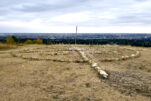Viva Vitality: Out of sight and locked up tight
By Brandee Brown on March 3, 2023.
Preventable injuries are the No. 1 cause of death for young children in Canada, and poisonings are quickly rising to the top of the list when it comes to unintentional hospitalizations for children under the age of 14. It may be surprising, but statistics from Alberta’s Poison and Information Service (PADIS) show more than 60% of reported exposures occur in the household and are a result of young children getting into medications, cleaners or other substances stored in the home. Safe storage prevents poisonings, so ensure you keep household poisons and toxins locked up tight and out of sight and reach of children by: Keeping medication in it is original container. Do not switch containers or use medication if the container doesn’t have a label or the label isn’t legible. Do not refer to medication as candy. Getting children to take their medication by making them think its candy can be very dangerous because most children will seek out candy. Call it by its proper name. Be careful of purses and bags. Keep purses, overnight bags and suitcases out of reach, as these may contain medication. Unpack medication from grocery bags first. A bottle of coated pills can look like candy to a young child. Remove medication from grocery bags and store it safely in case your child starts investigating the bags. Store cannabis products in their original packaging. Store all cannabis products as you would medications and other potentially toxic products. Other household hazards. Medications aren’t the only concern in the household. Many children have swallowed poisonous products because they were not stored properly or were taken out of their original containers. Some common household hazards include cleaners and detergents. Personal care products like hand sanitizer, mouthwash, perfume or nail polish. Car supplies, such as antifreeze and windshield washer fluid. Pesticides and fertilizers as well as certain plants. Cigarettes, nicotine products, vape liquids and their accessories. Having an action plan in place can help you and your family respond quickly in the event of a poisoning. If you suspect a poisoning has occurred contact your local poison control centre immediately. In case of a loss of consciousness, difficulty breathing or a medical emergency call 911 or head to the nearest emergency department. In Alberta, you can call 1-800-332-1414 to reach poison control. For more information visit Poison & Drug Info (PADIS). Brandee Brown is a health promotion facilitator with Alberta Health Services 13-12




